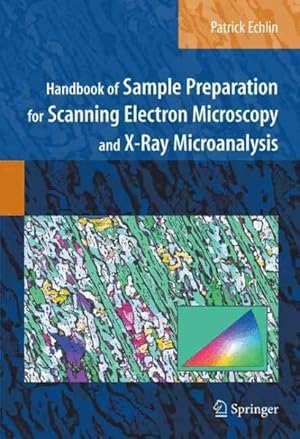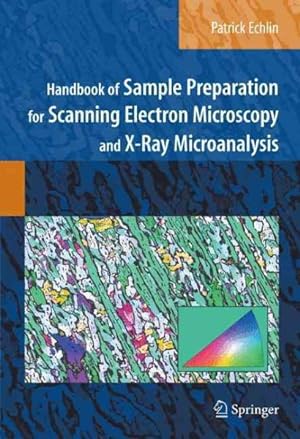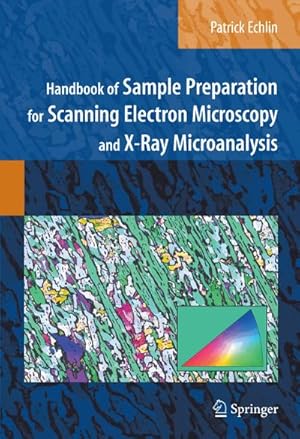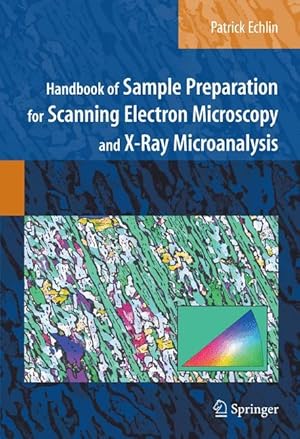Handbook Sample Preparation Scanning by Echlin Patrick (29 results)
Search filters
Product Type
- All Product Types
- Books (29)
- Magazines & Periodicals (No further results match this refinement)
- Comics (No further results match this refinement)
- Sheet Music (No further results match this refinement)
- Art, Prints & Posters (No further results match this refinement)
- Photographs (No further results match this refinement)
- Maps (No further results match this refinement)
- Manuscripts & Paper Collectibles (No further results match this refinement)
Condition Learn more
- New (25)
- As New, Fine or Near Fine (3)
- Very Good or Good (1)
- Fair or Poor (No further results match this refinement)
- As Described (No further results match this refinement)
Binding
Collectible Attributes
- First Edition (No further results match this refinement)
- Signed (No further results match this refinement)
- Dust Jacket (No further results match this refinement)
- Seller-Supplied Images (16)
- Not Print on Demand (21)
Language (1)
Price
- Any Price
- Under £ 20 (No further results match this refinement)
- £ 20 to £ 40 (No further results match this refinement)
- Over £ 40
Free Shipping
Seller Location
Seller Rating
-
Handbook of Sample Preparation for Scanning Electron Microscopy and X-Ray Microanalysis
Published by Springer, New York, NY, 2010
ISBN 10: 1441946748 ISBN 13: 9781441946744
Language: English
Seller: Robert Fulgham, Bookseller, Idaho Falls, ID, U.S.A.
Soft cover. Condition: Near Fine. Near Fine softcover. Appears unread. Name and date on the first page, else no writing or other marks. We wrap and box our books for shipping.
-
Handbook of Sample Preparation for Scanning Electron Microscopy and X-Ray Microanalysis
Seller: Anybook.com, Lincoln, United Kingdom
Condition: Good. This is an ex-library book and may have the usual library/used-book markings inside.This book has hardback covers. In good all round condition. Please note the Image in this listing is a stock photo and may not match the covers of the actual item,950grams, ISBN:9780387857305.
-
Handbook of Sample Preparation for Scanning Electron Microscopy and X-Ray Microanalysis
Seller: Ria Christie Collections, Uxbridge, United Kingdom
Condition: New. In.
-
Handbook of Sample Preparation for Scanning Electron Microscopy and X-Ray Microanalysis
Seller: GreatBookPricesUK, Woodford Green, United Kingdom
Condition: New.
-
Handbook of Sample Preparation for Scanning Electron Microscopy and X-Ray Microanalysis
Seller: GreatBookPrices, Columbia, MD, U.S.A.
Condition: New.
-
Handbook of Sample Preparation for Scanning Electron Microscopy and X-Ray Microanalysis
Seller: GreatBookPrices, Columbia, MD, U.S.A.
Condition: As New. Unread book in perfect condition.
-
Handbook of Sample Preparation for Scanning Electron Microscopy and X-Ray Microanalysis
Seller: Lucky's Textbooks, Dallas, TX, U.S.A.
Condition: New.
-
Handbook of Sample Preparation for Scanning Electron Microscopy and X-Ray Microanalysis
Seller: GreatBookPricesUK, Woodford Green, United Kingdom
Condition: As New. Unread book in perfect condition.
-
Handbook of Sample Preparation for Scanning Electron Microscopy and X-Ray Microanalysis
Published by Springer-Verlag New York Inc., US, 2009
ISBN 10: 0387857303 ISBN 13: 9780387857305
Language: English
Seller: Rarewaves.com USA, London, LONDO, United Kingdom
Hardback. Condition: New. 2009 ed. Scanning electr on microscopy (SEM) and x-ray microanalysis can produce magnified images and in situ chemical information from virtually any type of specimen. The two instruments generally operate in a high vacuum and a very dry environment in order to produce the high energy beam of electrons needed for imaging and analysis. With a few notable exceptions, most specimens destined for study in the SEM are poor conductors and composed of beam sensitive light elements containing variable amounts of water. In the SEM, the imaging system depends on the specimen being sufficiently electrically conductive to ensure that the bulk of the incoming electrons go to ground. The formation of the image depends on collecting the different signals that are scattered as a consequence of the high energy beam interacting with the sample. Backscattered electrons and secondary electrons are generated within the primary beam-sample interactive volume and are the two principal signals used to form images. The backscattered electron coefficient ( ? ) increases with increasing atomic number of the specimen, whereas the secondary electron coefficient ( ? ) is relatively insensitive to atomic number. This fundamental diff- ence in the two signals can have an important effect on the way samples may need to be prepared. The analytical system depends on collecting the x-ray photons that are generated within the sample as a consequence of interaction with the same high energy beam of primary electrons used to produce images.
-
Handbook of Sample Preparation for Scanning Electron Microscopy and X-Ray Microanalysis
Seller: Books Puddle, New York, NY, U.S.A.
Condition: New. pp. XII + 330.
-
Handbook of Sample Preparation for Scanning Electron Microscopy and X-Ray Microanalysis
Seller: preigu, Osnabrück, Germany
Taschenbuch. Condition: Neu. Handbook of Sample Preparation for Scanning Electron Microscopy and X-Ray Microanalysis | Patrick Echlin | Taschenbuch | xii | Englisch | 2010 | Springer US | EAN 9781441946744 | Verantwortliche Person für die EU: Springer Verlag GmbH, Tiergartenstr. 17, 69121 Heidelberg, juergen[dot]hartmann[at]springer[dot]com | Anbieter: preigu.
-
Handbook of Sample Preparation for Scanning Electron Microscopy and X-Ray Microanalysis
Published by Springer US, Springer US Nov 2010, 2010
ISBN 10: 1441946748 ISBN 13: 9781441946744
Language: English
Seller: buchversandmimpf2000, Emtmannsberg, BAYE, Germany
Taschenbuch. Condition: Neu. Neuware -Scanning electr on microscopy (SEM) and x-ray microanalysis can produce magnified images and in situ chemical information from virtually any type of specimen. The two instruments generally operate in a high vacuum and a very dry environment in order to produce the high energy beam of electrons needed for imaging and analysis. With a few notable exceptions, most specimens destined for study in the SEM are poor conductors and composed of beam sensitive light elements containing variable amounts of water. In the SEM, the imaging system depends on the specimen being sufficiently electrically conductive to ensure that the bulk of the incoming electrons go to ground. The formation of the image depends on collecting the different signals that are scattered as a consequence of the high energy beam interacting with the sample. Backscattered electrons and secondary electrons are generated within the primary beam-sample interactive volume and are the two principal signals used to form images. The backscattered electron coefficient ( ) increases with increasing atomic number of the specimen, whereas the secondary electron coefficient ( ) is relatively insensitive to atomic number. This fundamental diff- ence in the two signals can have an important effect on the way samples may need to be prepared. The analytical system depends on collecting the x-ray photons that are generated within the sample as a consequence of interaction with the same high energy beam of primary electrons used to produce images.Springer Verlag GmbH, Tiergartenstr. 17, 69121 Heidelberg 344 pp. Englisch.
-
Handbook of Sample Preparation for Scanning Electron Microscopy and X-Ray Microanalysis
Published by Springer US, Springer US Mär 2009, 2009
ISBN 10: 0387857303 ISBN 13: 9780387857305
Language: English
Seller: buchversandmimpf2000, Emtmannsberg, BAYE, Germany
Buch. Condition: Neu. Neuware -Scanning electr on microscopy (SEM) and x-ray microanalysis can produce magnified images and in situ chemical information from virtually any type of specimen. The two instruments generally operate in a high vacuum and a very dry environment in order to produce the high energy beam of electrons needed for imaging and analysis. With a few notable exceptions, most specimens destined for study in the SEM are poor conductors and composed of beam sensitive light elements containing variable amounts of water. In the SEM, the imaging system depends on the specimen being sufficiently electrically conductive to ensure that the bulk of the incoming electrons go to ground. The formation of the image depends on collecting the different signals that are scattered as a consequence of the high energy beam interacting with the sample. Backscattered electrons and secondary electrons are generated within the primary beam-sample interactive volume and are the two principal signals used to form images. The backscattered electron coefficient ( ) increases with increasing atomic number of the specimen, whereas the secondary electron coefficient ( ) is relatively insensitive to atomic number. This fundamental diff- ence in the two signals can have an important effect on the way samples may need to be prepared. The analytical system depends on collecting the x-ray photons that are generated within the sample as a consequence of interaction with the same high energy beam of primary electrons used to produce images.Springer Verlag GmbH, Tiergartenstr. 17, 69121 Heidelberg 344 pp. Englisch.
-
Handbook of Sample Preparation for Scanning Electron Microscopy and X-Ray Microanalysis
Published by Springer US, Springer US, 2010
ISBN 10: 1441946748 ISBN 13: 9781441946744
Language: English
Seller: AHA-BUCH GmbH, Einbeck, Germany
Taschenbuch. Condition: Neu. Druck auf Anfrage Neuware - Printed after ordering - Scanning electr on microscopy (SEM) and x-ray microanalysis can produce magnified images and in situ chemical information from virtually any type of specimen. The two instruments generally operate in a high vacuum and a very dry environment in order to produce the high energy beam of electrons needed for imaging and analysis. With a few notable exceptions, most specimens destined for study in the SEM are poor conductors and composed of beam sensitive light elements containing variable amounts of water. In the SEM, the imaging system depends on the specimen being sufficiently electrically conductive to ensure that the bulk of the incoming electrons go to ground. The formation of the image depends on collecting the different signals that are scattered as a consequence of the high energy beam interacting with the sample. Backscattered electrons and secondary electrons are generated within the primary beam-sample interactive volume and are the two principal signals used to form images. The backscattered electron coefficient ( ) increases with increasing atomic number of the specimen, whereas the secondary electron coefficient ( ) is relatively insensitive to atomic number. This fundamental diff- ence in the two signals can have an important effect on the way samples may need to be prepared. The analytical system depends on collecting the x-ray photons that are generated within the sample as a consequence of interaction with the same high energy beam of primary electrons used to produce images.
-
Handbook of Sample Preparation for Scanning Electron Microscopy and X-Ray Microanalysis
Seller: Books Puddle, New York, NY, U.S.A.
Condition: New. pp. 344.
-
Handbook of Sample Preparation for Scanning Electron Microscopy and X-Ray Microanalysis
Published by Springer US, Springer US, 2009
ISBN 10: 0387857303 ISBN 13: 9780387857305
Language: English
Seller: AHA-BUCH GmbH, Einbeck, Germany
Buch. Condition: Neu. Druck auf Anfrage Neuware - Printed after ordering - Scanning electr on microscopy (SEM) and x-ray microanalysis can produce magnified images and in situ chemical information from virtually any type of specimen. The two instruments generally operate in a high vacuum and a very dry environment in order to produce the high energy beam of electrons needed for imaging and analysis. With a few notable exceptions, most specimens destined for study in the SEM are poor conductors and composed of beam sensitive light elements containing variable amounts of water. In the SEM, the imaging system depends on the specimen being sufficiently electrically conductive to ensure that the bulk of the incoming electrons go to ground. The formation of the image depends on collecting the different signals that are scattered as a consequence of the high energy beam interacting with the sample. Backscattered electrons and secondary electrons are generated within the primary beam-sample interactive volume and are the two principal signals used to form images. The backscattered electron coefficient ( ) increases with increasing atomic number of the specimen, whereas the secondary electron coefficient ( ) is relatively insensitive to atomic number. This fundamental diff- ence in the two signals can have an important effect on the way samples may need to be prepared. The analytical system depends on collecting the x-ray photons that are generated within the sample as a consequence of interaction with the same high energy beam of primary electrons used to produce images.
-
Handbook of Sample Preparation for Scanning Electron Microscopy and X-ray Microanalysis
Seller: Revaluation Books, Exeter, United Kingdom
Hardcover. Condition: Brand New. 1st edition. 200 pages. 10.25x7.25x1.00 inches. In Stock.
-
Handbook of Sample Preparation for Scanning Electron Microscopy and X-Ray Microanalysis
Seller: Revaluation Books, Exeter, United Kingdom
Paperback. Condition: Brand New. 342 pages. 9.90x6.90x0.90 inches. In Stock.
-
Handbook of Sample Preparation for Scanning Electron Microscopy and X-Ray Microanalysis
Seller: Revaluation Books, Exeter, United Kingdom
Paperback. Condition: Brand New. 342 pages. 9.90x6.90x0.90 inches. In Stock.
-
Handbook of Sample Preparation for Scanning Electron Microscopy and X-Ray Microanalysis
Seller: Majestic Books, Hounslow, United Kingdom
Condition: New. pp. 344.
-
Handbook of Sample Preparation for Scanning Electron Microscopy and X-Ray Microanalysis
Published by Springer-Verlag New York Inc., US, 2009
ISBN 10: 0387857303 ISBN 13: 9780387857305
Language: English
Seller: Rarewaves.com UK, London, United Kingdom
Hardback. Condition: New. 2009 ed. Scanning electr on microscopy (SEM) and x-ray microanalysis can produce magnified images and in situ chemical information from virtually any type of specimen. The two instruments generally operate in a high vacuum and a very dry environment in order to produce the high energy beam of electrons needed for imaging and analysis. With a few notable exceptions, most specimens destined for study in the SEM are poor conductors and composed of beam sensitive light elements containing variable amounts of water. In the SEM, the imaging system depends on the specimen being sufficiently electrically conductive to ensure that the bulk of the incoming electrons go to ground. The formation of the image depends on collecting the different signals that are scattered as a consequence of the high energy beam interacting with the sample. Backscattered electrons and secondary electrons are generated within the primary beam-sample interactive volume and are the two principal signals used to form images. The backscattered electron coefficient ( ? ) increases with increasing atomic number of the specimen, whereas the secondary electron coefficient ( ? ) is relatively insensitive to atomic number. This fundamental diff- ence in the two signals can have an important effect on the way samples may need to be prepared. The analytical system depends on collecting the x-ray photons that are generated within the sample as a consequence of interaction with the same high energy beam of primary electrons used to produce images.
-
Handbook of Sample Preparation for Scanning Electron Microscopy and X-Ray Microanalysis
Published by Springer-Verlag New York Inc., 2009
ISBN 10: 0387857303 ISBN 13: 9780387857305
Language: English
Seller: THE SAINT BOOKSTORE, Southport, United Kingdom
Hardback. Condition: New. This item is printed on demand. New copy - Usually dispatched within 5-9 working days 838.
-
Handbook of Sample Preparation for Scanning Electron Microscopy and X-Ray Microanalysis
Published by Springer US, Springer US Nov 2010, 2010
ISBN 10: 1441946748 ISBN 13: 9781441946744
Language: English
Seller: BuchWeltWeit Ludwig Meier e.K., Bergisch Gladbach, Germany
Taschenbuch. Condition: Neu. This item is printed on demand - it takes 3-4 days longer - Neuware -Scanning electr on microscopy (SEM) and x-ray microanalysis can produce magnified images and in situ chemical information from virtually any type of specimen. The two instruments generally operate in a high vacuum and a very dry environment in order to produce the high energy beam of electrons needed for imaging and analysis. With a few notable exceptions, most specimens destined for study in the SEM are poor conductors and composed of beam sensitive light elements containing variable amounts of water. In the SEM, the imaging system depends on the specimen being sufficiently electrically conductive to ensure that the bulk of the incoming electrons go to ground. The formation of the image depends on collecting the different signals that are scattered as a consequence of the high energy beam interacting with the sample. Backscattered electrons and secondary electrons are generated within the primary beam-sample interactive volume and are the two principal signals used to form images. The backscattered electron coefficient ( ) increases with increasing atomic number of the specimen, whereas the secondary electron coefficient ( ) is relatively insensitive to atomic number. This fundamental diff- ence in the two signals can have an important effect on the way samples may need to be prepared. The analytical system depends on collecting the x-ray photons that are generated within the sample as a consequence of interaction with the same high energy beam of primary electrons used to produce images. 344 pp. Englisch.
-
Handbook of Sample Preparation for Scanning Electron Microscopy and X-Ray Microanalysis
Published by Springer US, Springer US Mär 2009, 2009
ISBN 10: 0387857303 ISBN 13: 9780387857305
Language: English
Seller: BuchWeltWeit Ludwig Meier e.K., Bergisch Gladbach, Germany
Buch. Condition: Neu. This item is printed on demand - it takes 3-4 days longer - Neuware -Scanning electr on microscopy (SEM) and x-ray microanalysis can produce magnified images and in situ chemical information from virtually any type of specimen. The two instruments generally operate in a high vacuum and a very dry environment in order to produce the high energy beam of electrons needed for imaging and analysis. With a few notable exceptions, most specimens destined for study in the SEM are poor conductors and composed of beam sensitive light elements containing variable amounts of water. In the SEM, the imaging system depends on the specimen being sufficiently electrically conductive to ensure that the bulk of the incoming electrons go to ground. The formation of the image depends on collecting the different signals that are scattered as a consequence of the high energy beam interacting with the sample. Backscattered electrons and secondary electrons are generated within the primary beam-sample interactive volume and are the two principal signals used to form images. The backscattered electron coefficient ( ) increases with increasing atomic number of the specimen, whereas the secondary electron coefficient ( ) is relatively insensitive to atomic number. This fundamental diff- ence in the two signals can have an important effect on the way samples may need to be prepared. The analytical system depends on collecting the x-ray photons that are generated within the sample as a consequence of interaction with the same high energy beam of primary electrons used to produce images. 344 pp. Englisch.
-
Handbook of Sample Preparation for Scanning Electron Microscopy and X-Ray Microanalysis
Seller: moluna, Greven, Germany
Condition: New. Dieser Artikel ist ein Print on Demand Artikel und wird nach Ihrer Bestellung fuer Sie gedruckt. Identifies problems that all specimens present in examining their structure and analysis in the SEMDescribes a series of protocols to ensure that a specimen is properly prepared once the particular problems are identifiedGuides the reader t.
-
Handbook of Sample Preparation for Scanning Electron Microscopy and X-Ray Microanalysis
Seller: moluna, Greven, Germany
Gebunden. Condition: New. Dieser Artikel ist ein Print on Demand Artikel und wird nach Ihrer Bestellung fuer Sie gedruckt. Identifies problems that all specimens present in examining their structure and analysis in the SEMDescribes a series of protocols to ensure that a specimen is properly prepared once the particular problems are identifiedGuides the reader t.
-
Handbook of Sample Preparation for Scanning Electron Microscopy and X-Ray Microanalysis
Seller: preigu, Osnabrück, Germany
Buch. Condition: Neu. Handbook of Sample Preparation for Scanning Electron Microscopy and X-Ray Microanalysis | Patrick Echlin | Buch | xii | Englisch | 2009 | Copernicus | EAN 9780387857305 | Verantwortliche Person für die EU: Springer Verlag GmbH, Tiergartenstr. 17, 69121 Heidelberg, juergen[dot]hartmann[at]springer[dot]com | Anbieter: preigu Print on Demand.
-
Handbook of Sample Preparation for Scanning Electron Microscopy and X-Ray Microanalysis
Seller: Majestic Books, Hounslow, United Kingdom
Condition: New. Print on Demand pp. XII + 330 159 Illus. (Col.).
-
Handbook of Sample Preparation for Scanning Electron Microscopy and X-Ray Microanalysis
Seller: Biblios, Frankfurt am main, HESSE, Germany
Condition: New. PRINT ON DEMAND pp. XII + 330.



















